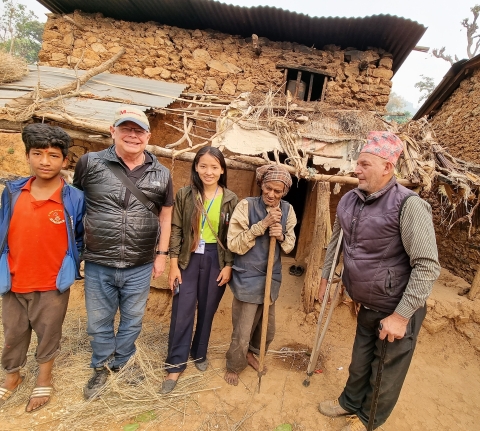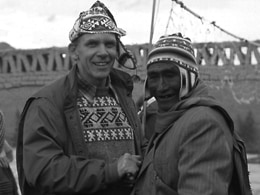
God so loved the world that he gave his only Son,
so everyone who believes in him might have eternal life.
John 3:16
Despite what we experience in the world today, the readings challenge us not to despair. The Psalms encourage us to believe that better days are ahead as we move from darkness to light. These experiences can transform us into believers.
In this process of personal transformation, it is helpful to realize how wonderful God’s love is, knowing that God was willing to give his only Son so that we might have eternal life. The unfathomable depth of God’s love is awesome to consider. God sends us his Son to illumine our path in the darkness, especially when we have no sense of direction. I wonder if we can mirror this care for one another and for our world.
This Lenten season, I am reminded of many changes taking place in Nepal and other parts of the world. On my arrival in Nepal in 1977, when it was easy to view the snow-covered Himalayan mountains and drink from the mountain waters that flowed from the north to the south. But that is no longer possible.
The fertile fields around the Kathmandu Valley have been taken over by brick factories and homes and streets and shops are ubiquitous. A valley, once self-supporting, is now dependent on hundreds of trucks that snake the landscape each day, transporting supplies to feed its ever-growing appetite.
Once-fertile village fields that harvested the food for surrounding villages have been washed away and the village population can no longer exist on the meager yields. Due to climate, social, and political instability, many extended families and traditional ways of living are being quickly disbanded and destroyed. Families become internally displaced, and then, with no other option, move out of Nepal. These newly created refugees begin a journey that could take them any place in the world to survive. But we know that many do not survive.
I have witnessed the weeping and sorrows of those who leave and those left behind. But I have also seen a resilience: a will to continue with the hardships, forged by a desire to experience a better way of life—a life that is lived not only for self, but above all, for another. This is the flame that burns and excites and drives and will not be extinguished.
The Epistle today reminds us of the great love God has for us and how this has saved us. God created us for good works and to love and care for one another as God has loved and cared for us. The readings ask us to share this great gift of God’s love and care with one another and make it our way of living also. So, how do we care for one another and for all of creation? In a suffering and broken world, what am I willing to offer for the sake of another? God so loved the world that he gave us his only the Son. What am I willing to give?
- by Fr. Joseph Thaler, MM
Questions for Reflection
- What is one way you can care for creation by caring for another person?
- How might care for nature help another person in your life to experience a better way of life?
Prayer
Beloved God,
This little moment we would spend with Thee
in gratitude for a lifetime of little moments.
I would thank Thee for Thy Spirit
breathing in me, directing me
Stained Glassto follow the flow of Freedom.
I would thank Thee for Thy Promise,
fulfilled in me, assuring me
of Thine abiding Presence.
I would thank Thee for Thy faithfulness
strengthening me, upholding me
in Compassion’s trustworthy arms,
I would thank Thee for Thy Providence
sheltering me, reminding me
of Thine eternal Abundance made available to me.
I would thank Thee for Thy Life,
extended in me,
extended in all Thy children,
each Thine own original creation.
- Sister Joan Metzner, MM
Fast
Consider the ways in which you can conserve the precious resource of water in your daily life. Best practices for conserving water can be found here: https://mogc.info/conservewater
Action
The U.S. has one of the highest plastic consumption rates in the world. Single-use plastics (straws, plastic bottles, utensils, etc.) are discarded too easily, carelessly ending up in the streets and natural spaces where they break down into microplastics and pose a toxic threat to ecosystems, wildlife, and humans. Currently, the U.S. has not placed a single-use plastic ban on a federal level, but this responsibility has been taken up by states and cities.
Looking to the future, the U.S. Interior Department has stated that by 2032, single-use plastic products will be phased out of national parks and some public lands. Around 480 million acres of federal land will be under this new legislation. This is predicted to reduce around 14 million tons of plastic that ends up in our oceans.
Though it may be some time before plastic bans will be implemented on a federal level, the current focus should be on what can be done on a local scale, such as in cities and counties. Since one of the main impediments is compliance, check to see if your city or state has bans already in place and follow the guidelines. https://mogc.info/PlasticsBans
Quote
 |
|
This reflection was published as part of our 2024 Lent Reflection Guide. The guide is also available in Spanish.
Photo of Father Joseph Thaler, MM, in a village in Nepal courtesy of the author. Photo of Father Eugene Toland, MM, courtesy of the Maryknoll Fathers and Brothers.
